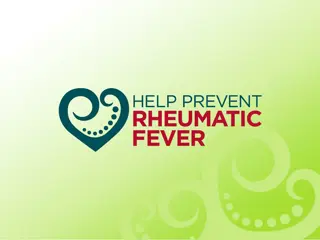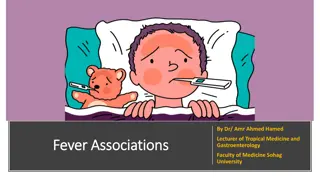
Acute Rheumatic Fever in Children
Learn about the causes, symptoms, risk factors, complications, and treatment of acute rheumatic fever in children. Rheumatic fever, often stemming from untreated strep throat, can lead to permanent heart damage if not managed properly. Early detection and treatment are crucial in preventing long-term consequences.
Download Presentation

Please find below an Image/Link to download the presentation.
The content on the website is provided AS IS for your information and personal use only. It may not be sold, licensed, or shared on other websites without obtaining consent from the author. If you encounter any issues during the download, it is possible that the publisher has removed the file from their server.
You are allowed to download the files provided on this website for personal or commercial use, subject to the condition that they are used lawfully. All files are the property of their respective owners.
The content on the website is provided AS IS for your information and personal use only. It may not be sold, licensed, or shared on other websites without obtaining consent from the author.
E N D
Presentation Transcript
StudyMafia.Org Acute Rheumatic Fever Submitted To: Submitted By: Studymafia.org Studymafia.org
Table Contents Definition Introduction Symptoms of Acute Rheumatic Fever Causes of Acute Rheumatic Fever Risk-Factors of Acute Rheumatic Fever Complications of Acute Rheumatic Fever Treatment of Acute Rheumatic Fever Conclusion 2
Definition Rheumatic fever is an inflammatory disease that can develop when strep throat or scarlet fever isn't properly treated. 3
Introduction Rheumatic fever most often affects children ages 5 to 15. Rheumatic fever can cause permanent damage to the heart, including damaged heart valves and heart failure. Treatment can ease pain, reduce damage from inflammation and prevent a recurrence of rheumatic fever. 4
Causes of Acute Rheumatic Fever Rheumatic fever can occur after a throat infection from a bacteria called group A streptococcus. Group A streptococcus infections of the throat cause strep throat or, less commonly, scarlet fever. Group A streptococcus infections of the skin or other parts of the body rarely trigger rheumatic fever. 6
Causes of Acute Rheumatic Fever The link between strep infection and rheumatic fever isn't clear. It appears that the bacteria trick the immune system into attacking otherwise healthy tissue. The body's immune system typically targets infection-causing bacteria. In rheumatic fever, the immune system mistakenly attacks healthy tissue, particularly in the heart, joints, skin and central nervous system. 7
Causes of Acute Rheumatic Fever This faulty immune system reaction results in swelling of the tissues (inflammation). There's little chance of developing rheumatic fever when a strep throat infection is promptly treated with antibiotics and all the medication is taken as prescribed. If a child has one or more episodes of strep throat or scarlet fever that aren't properly treated, rheumatic fever may occur. 8
Risk Factors of Acute Rheumatic Fever Genes: Some people have one or more genes that might make them more likely to develop rheumatic fever. Specific type of strep bacteria: Certain strains of strep bacteria are more likely to contribute to rheumatic fever than are other strains. 9
Risk Factors of Acute Rheumatic Fever Environmental factors: A greater risk of rheumatic fever is associated with overcrowding, poor sanitation and other conditions that can cause strep bacteria to easily spread among many people. 10
Complications of Acute Rheumatic Fever Inflammation caused by rheumatic fever can last a few weeks to several months. For some people, the inflammation causes long-term complications. One complication of rheumatic fever is permanent damage to the heart (rheumatic heart disease). Rheumatic heart disease usually occurs years to decades after the original illness. 11
Complications of Acute Rheumatic Fever Rheumatic fever can cause the following types of heart damage: Narrowing of a heart valve (valve stenosis). This decreases blood flow. Leaky heart valve (valve regurgitation). Blood flows backward across the valve. Damage to heart muscle. The inflammation associated with rheumatic fever can weaken the heart muscle, affecting its ability to pump. 12
Treatment of Acute Rheumatic Fever Antibiotics. Penicillin or another antibiotic is typically prescribed to treat the strep bacteria. After the first antibiotic treatment is fully finished, a provider typically prescribes another course of antibiotics to prevent recurrence of rheumatic fever. 13
Treatment of Acute Rheumatic Fever Anti-inflammatory drugs. Aspirin or naproxen (Naprosyn, Naprelan, Anaprox DS) can help reduce inflammation, fever and pain. If symptoms are severe or a child doesn't get better with anti-inflammatory medicines, a corticosteroid might be prescribed. 14
Treatment of Acute Rheumatic Fever Antiseizure drugs. Medications such as valproic acid or carbamazepine (Carbatrol, Tegretol, others) may be used to treat severe involuntary movements caused by Sydenham chorea. 15
Conclusion Rheumatic fever (acute rheumatic fever) is a condition that can affect the heart, joints, brain, and skin. Rheumatic fever can develop if strep throat, scarlet fever, and strep skin infections are not treated properly. On This Page. Rheumatic fever is an inflammatory condition. 16
References Google.com Wikipedia.org Studymafia.org Slidespanda.com
Thanks To StudyMafia.org






















